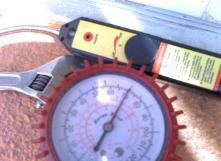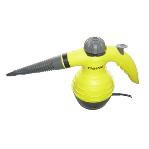Things technicians do to sabotage your aircon
By Technicians:
1) Topping up of refrigerant

The refrigerant (commonly known as FREON) is not a magic substance, it is not cold by itself. Scientists around the
world are busy trying to find that magic substance and we’re not too sure if anyone’s found that. What we are very sure is that refrigerant used in your air conditioner is definitely not that magic substance. Do not be mistaken that if you add more FREON into your system, your air conditioner will be cooler. In fact, the opposite will be the result.
The fundamental of air conditioning is the use of a compressor to compress and decompress the FREON. It is through the manipulation of the gas pressure that created the temperature difference; thus it is very important for an air conditioning technician to be well versed with the enthalpy chart of different types of refrigerant before meddling with the gas.
If too much liquefied gas is produced by over charging your system, this is a condition called “evaporator flooding”.
Meaning, the entire blower is filled with liquefied Freon, thus, leaving no more room for evaporation to take place. This explains why adding more gas into the system WILL NOT make your system any cooler, but rather it will make it less cold and worst sending not evaporated liquid FREON back to the compressor (if exceeds your manufacturer’s specification for the critical amount of gas to go into your
system), WILL cause permanent damage to your compressor due to 2 reasons. First, the liquefied Freon returning to the compressor will dilute and damage the compressor oil, causing premature wear and tear. Secondly, as liquid cannot be compressed, sending liquid directly into the compressor will cause serious mechanical damage to your compressor.
2) Using refrigerant gas to purge/flush the fan coil (normally to the condenser)
Do not use refrigerant to blow at the condensing coil in an attempt to purge dust off the surface. Not only is it illegal (for causing ozone depletion), it also a very wrong thing to do as the gas itself will cause the aluminium fin to corrode.
3) Full dismantling of fan coil for chemical cleaning without ensuring total removal of water and water
moisture.
When a fan coil is removed for chemical cleaning and subsequently washed with large amount of water, not done properly, some water will enter the copper pipe. This water moisture cannot be taken likely because their presence will damage the compressor oil. When the compressor oil is damaged, it results in high friction which produces lots of heat and abrasion.
4) Full dismantling of fan coil for chemical cleaning without ensuring joints are not damaged resulting in
future gas leak
5) Removing of overload relay in order to force run a compressor
When a compressor overheats, it will trigger an overload relay to shut down the compressor. The end result is that the air conditioner no longer produces cold air. If at this moment, a technician bypass this overload relay in order to force run the compressor, the compressor will certainly overheat.
When the temperature of the compressor rise above 150’C, the compressor oil will fully disintegrate. Meaning, this will cause enormous wear and tear to the compressor, and causing the dryer filters to be choked.
If the temperature of the compressor further exceeds 250’C, the R22 gas will break down and produce acid in the
presence of water moisture. This will be the worst; the acid will start to corrode the copper pipes, resulting in leakage at places least likely to occur; at the connecting pipes, which possible is tucked away from sight; above the false ceiling, inside walls or behind cabinets. This will be a home owner’s worst nightmare.
6) Taking suction pressure as indicator for appropriate gas level
Please Do Not meddle with the gas unnecessarily Unless there is a gas leak which is rare, please do not top up more than necessary gas. Never attempt to read the gas pressure blindly. The gas pressure varies according to different heat load and condition of the heat exchangers. When the fan coil is very dirty, the pressure will be low because liquified freon are not fully evaporated.
Newer inverter air conditioners called regulate their compressor rotational speed and causes the pressure to vary.
If during installation certain part of the connecting pipe is kinked/dented, it will show an inaccurate pressure reading as well. While gas pressure gives us an indication of the amount of gas, it must be read according to the compressor running speed. Technician must be well versed with the saturation table of different types of gas. Head and suction pressure must be considered in relation to the running ampere and temperature of the indoor and outdoor environment.
5) Using hot steam cleaner /hot water to disinfect the air conditioner.

Undeniable, hot steam / water kills germs. BUT please keep the hot steam away from the electronic board, you do not want to damage the sensitive electronics, don’t you?
Mold is commonly found on aircon blower. White mold, penicillium and black mold is very common. They do not “die” unless the temperature is raised above 140’C. Steam which is 100’C, cannot “kill” mold but rather stress them, causing them to produce mycotoxin, you will be worst off. If you google and read up on mold, you’ll know what i’m saying is true.
1 thought on “Things technicians do to sabotage your aircon”